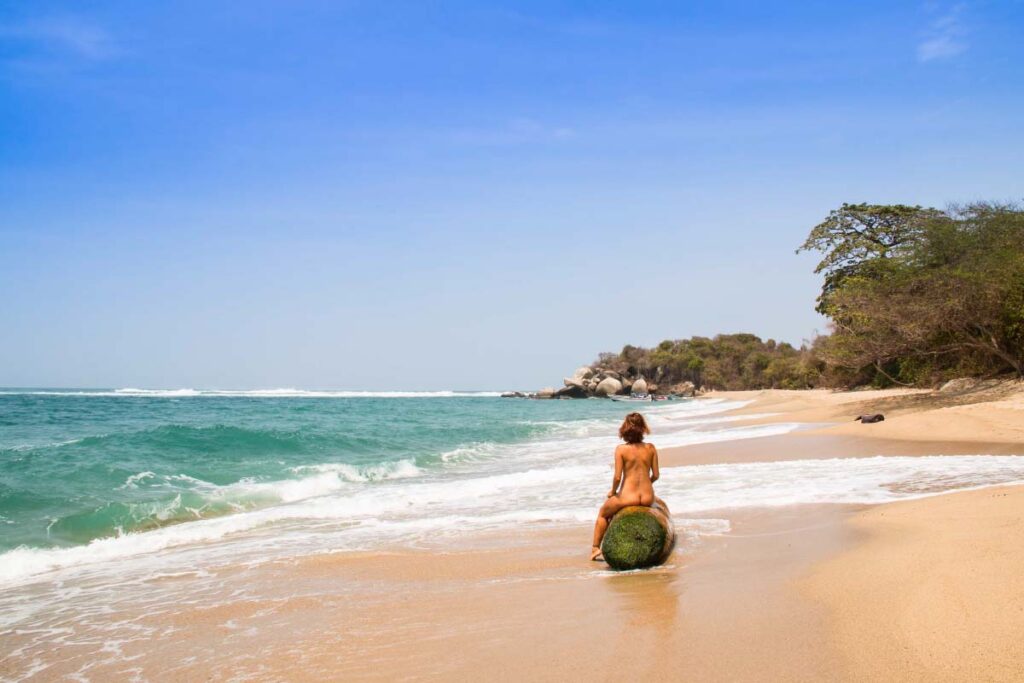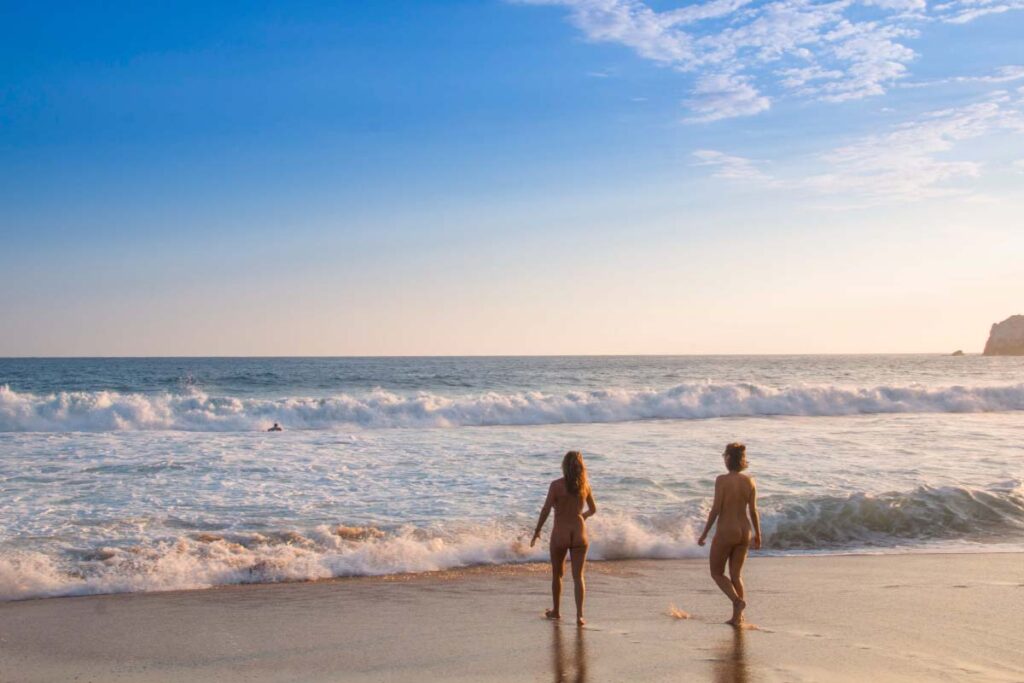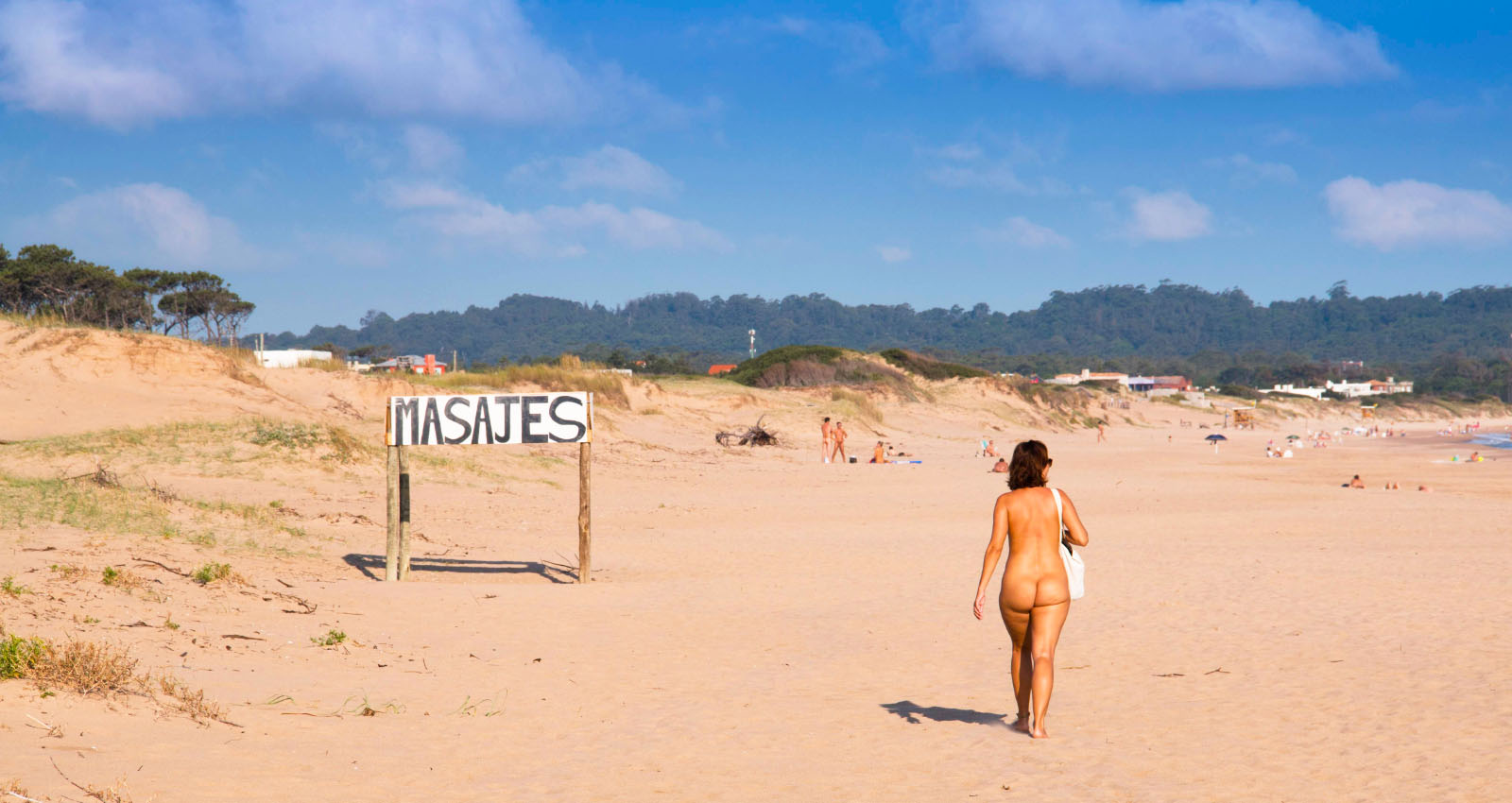Spain is one of the few countries in the world where nudity in public places is completely legal. Really, if we decided to walk out of our door naked this afternoon for a long stroll on Benidorm boulevard, there’s not a single law that can prohibit us from doing so. But that’s not the plan for today. Although we like to strive for a world in which nudity is normalized, we also realize that we’re not there yet and that the shock effect of walking naked among the clothed families would probably work counterproductive.
A short walk down the road from our place is a lovely beach called Cala de Finestrat. White sands, emerald-colored sea, you get the picture. But even there, we won’t be going full monty. Instead, we rather hike for half an hour through the mountains towards Racó Del Conill, one of the official nude beaches in the region. Or as they are locally called: “playas de tradición nudista”. Beaches with a nudist tradition. You got to love the poetry in the Spanish language.

Why do nude beaches exist in Spain?
In a country where nudity is allowed all around, why do we still feel the need to go to actual nude beaches? On one hand, there’s the social aspect of naturism. Other than getting a tan and skinny dipping in the Mediterranean, we also like the friendly atmosphere among naturists. We like the friendly waves, the smiles, and the conversations. And we like that we don’t fall out of tone. Although we can legally get naked on the beach down the road, we can be sure that there will be quite some gawks and stares. Just because we would be the only nudes on a clothed beach.
The first time when we visited Racó Del Conill, we met up with a local naturist group. They call themselves activists, who strive for the protection of the nude beach. These groups can be found all around Spain, each protecting a specific nude beach. So let’s get this straight. Nudity is legal in Spain, especially in natural places like beaches. We already figured out why designated nude beaches are more agreeable, but why do they need to be protected?

Why do nude beaches need to be protected?
During the several times that we have meanwhile visited the Racó Del Conill nude beach, we were never the only naked people. In fact, most of the time, the nudes were the large majority. We’ve had no negative experience yet at the beach. So what does this beach need protection for? Of course, we ended up here in winter and in the height of the COVID pandemic. It’s not hard to imagine that during the summer months, when tourists from around Europe flock together on the Spanish Costas, the number of bathing suit covered butts could easily outnumber the naturists.
We have already seen this several years ago in southern Croatia. Hours of research had produced an extensive list of nude beaches at the Dobrivnik Rivièra, but once we got there, we found most of them flooded with clothed visitors. Who sometimes even crossed out the “FKK” sign. It felt as if the walls were closing in on us. If there had been groups of activists who talked with the local government about the importance of the nude beach, educated the clothed visitors about the naturist tradition of the beach, and made sure that thanks to their presence you’re never the only naked person, we may have had a much more agreeable time.

Nude beach activism around the world
Spain is not the only country where people dedicate their time to the protection of nude beaches. When we were going to visit Praia do Abricó near Rio de Janeiro in Brazil, we had been told to only come during the weekends when the local naturist group would be present. We didn’t listen. It was a warm Friday afternoon and we wanted to go skinny dipping. We never actually made it into the water. When we arrived at the beach, the only other visitors were a handful of single men. All of them were standing, a couple of meters from each other. Nobody said a word. They just stared. It felt as if something was about to happen, but we weren’t sure if it was going to be an orgy, a drug deal, or a fight. In any case, nothing that we wanted to experience.
When we went back to the beach the day after, the atmosphere couldn’t have been more different. There were couples, families, groups of women. There was a guy selling beers, someone giving beach massages, and nothing but kind hellos and friendly smiles. The naturist group was present.
In Portugal, we met with the group Alma Naturista. Their goal wasn’t to chase the creeps away from the dunes but to focus on the natural side of naturism. Together with a team of volunteers they often organize beach cleanups. Not only do they remove litter from the nude beaches south of Lisbon, but while they’re at it, they clean some of the textile beaches too. If you ever find yourself on a beach at the Caparica coast and you think “damn, it’s clean here”, make sure to send Alma Naturista a thank you note.
Also in the USA, protectors of nude beaches are common. In Florida alone, there’s the Haulover Beach group taking care of the state’s most popular nude beach. But there’s also South Florida Free Beaches, the BEACHES Foundation, and probably several others. On the other side of the country, the Southern California Naturist Association with the help of AANR West takes care of the protection of the Californian nude beaches.
Why nude beaches are so important
Exploring a new nude beach is always a toss of a coin. Sometimes you arrive in the most wonderful scenery. Other times you’re not sure whether you ended up in a peepshow or a freakshow. With naturist resorts popping up all around the world, isn’t it just a lot easier to put some money on the table and visit a private place instead?
For a long time, resort owners weren’t big fans of nude beaches either. They figured that if nudity wouldn’t be allowed in public places, they would have the monopoly on the naked butt. They would be able to charge whatever they want and not give you much in return except for a jail-free card for taking off your clothes. As resort owners didn’t only provide most of the fundings for naturist federations but regularly had board positions too, local groups of beach protectors were often not supported.
The Spanish naturist federation is an exception to this and has a long history of activism and protecting the right of public nudity. And the results are there. Not just in numbers of nude beaches, but also in terms of gender and age balance. In fact, if there’s something that we’ve learned during our naturist travels around the world, it’s that in countries where the naturist federation supports the local groups more than the resorts, there tend to be more female naturists and more of the younger generations.
There was one thing that the resort owners didn’t realize: Most people don’t get naked for the first time at a resort. They don’t put tens or hundreds of euros on the table to try something of which they’re not even sure whether they’ll like it. Most people have their first naturist experience at a nude beach. And when they enjoy it, they will start looking at the other options. So instead of eliminating the competition, resorts were actually biting the hand that fed them.

How can you help to protect the nude beaches?
The absolute very best thing that you can do to help the protection of nude beaches, is just going to the beach, taking off your clothes, and enjoying a wonderful day in the nude. That doesn’t sound so bad, does it?
The more naked people on the nude beaches, the more the clothed visitors will realize that this may not be the kind of beach for them. Or the more they will feel encouraged to take off their clothes as well. The local governments too will realize the importance of a nude beach when it’s frequently visited by local and foreign guests.
And if you want to do more, join a local naturist group. Not only will you help to build on a future for naturism, but you may also meet some great people and you’ll always have some friends to go to the beach with.

Support Naked Wanderings
Do you like what we do for naturism and naturists?
Did we make you laugh or cry?
Did we help you find the information you were looking for?
Then definitely join our Patreon community!





Raco used to be a very good and nice Nudebeach all year round. Very seldom you saw people in bathing suits. But a few years ago this all started to change. In summer months there is a chiringuito, walking in the area is more promoted and a large free parking space. Since the chiringuito is there every summer, it makes it in summer months a textile beach. It’s overcrowded, only one in ten or less are nudists in summer months. The textiles discovered it and are visiting more and more. The thing is lots of people I know from the Raco beach are going to another beach most of the time. So do I, most of the time I go to Playa Esparello Montiboli. The beach is bigger, so more space and almost no textile people, not even in summer. In winter I also go to Raco, hope to see you there one of these days.
Indeed, the circumstances like the chiringuito, the parking lot, and the nice hiking trails prove to be a disadvantage for Raco del Conill. We did hear that the Spanish naturist federation is talking a lot with the local government of Villa Joyosa to recommend the nude use of the beach more.
Yes and the town of Villajoyosa is supporting the nudists. They made flyers in different languages and are really trying to be helpful.
Creo que la información que tenéis no es totalmente correcta.
Por desgracia, en España muchas playas y otros espacios nudistas se están perdiendo año tras año y es difícil luchar contra ello.
Con respecto a que puedes estar desnudo donde quieras hay que hacer matizaciones.
Hay que diferenciar que por estar desnudo en donde quieras no estás cometiendo un delito, es decir, no se puede aplicar el código penal ni pueden imponerte penas de cárcel, pero por el contrario, pero si existen ordenanzas y otras leyes por las que sí puedes tener consecuencias administrativas, es decir, multas económicas sin consecuencias penales.
Si queréis más información podéis consultar el siguiente artículo:
http://desnudizate.blogspot.com/2020/06/es-delito-el-nudismo.html
Os deseamos una feliz estancia en España
Un saludo
¡Hola! Sí, sabemos que hemos simplificado un poco la situación. Aunque estamos usando España como ejemplo en esta publicación, realmente habla de playas en todo el mundo y el problema de que están desapareciendo. No era el propósito de esta publicación brindar un conocimiento profundo de cómo funcionan las leyes en España.
Andy from NZ, sadly here in NZ out free beach groups do not support official nude beaches. Furthermore they actively campaign against them. Go figure!
That is really weird…
Is is true what Nakedu writes. What is crucial in Spanish public life is “ser cordial”. Being respectful. It is very Spanish that not having clothes is not a crime. So you could never go to jail for being naked in the street if you would be so poor that you have no clothes. But public order is another thing and in general a serious thing in Spain. It is more a “let’s keep things nice for everybody” system. If you would be fully dressed in five fur coats but go french kissing and touching each other all over in front of a church, that would be considered not very cordial just like being even half naked there. On the other side, private territory, including your own home and garden is where you really can do anything you like. Which many Spaniards enjoy to the fullest, because most Spaniards are only catholic during office hours. But inside have a more classic roman tradition. For the same reason, you mostly only find gay bars in Spain in tourist resorts. In any small village there are places where gays meet, everybody knows about it, nobody gets upset, nobody makes a big deal out of it. In general it is considered a bit ridiculous or even disrespectful to paint it all over the wall. The whole village might know even the priest can be found there every weekend. But nobody would speak badly about it in public. At home, different story. In the same sense, nude beaches and resorts are a bit of an oddity in Spain. Why drive all the way to such a beach when it is perfectly normal to walk around naked in the privacy of your own home. With the village priest if needs be. As long as you keep it discrete. And cordial. Then nobody actually cares. And nobody is really shocked because they have their own habits caprichios and cachondeos too. Spanish culture is much more modern and liberal than the cultures of the north of Europe in that respect.
You are definitely right that the truth is more complicated in Spain than that you can just be naked everywhere. From a legal point of view, you can, but from a social point of view, it’s something different. We didn’t really dig deep into this, because that’s not really the topic of this blog post.
But, now that we’re talking about this, if the Spanish value respect so much, why does it seem that it only works in one direction. Lots of Spanish nude beaches get flooded by textiles in the summer months. And not just tourists. The nude beach that we use in this example, Raco del Conill, has a huge sign that says that it’s a nude beach. And there are 12 equally nice textile beaches in the region. Yet, the naturist group that protects the beach says that in the summer months, up to 90% of the visitors don’t go naked…
It’s not true that nude beaches and resorts are an oddity in Spain. Spain currently has more than 400 official nude beaches, which makes them probably number 1 in Europe. And the country has over 50 naturist resorts, this should also put them in the top 3 of Europe…
No es exactamente el respeto, más bien es “paz social”, pues el respeto es solo en la dirección mayoritaria.
La mayoría de la gente es textil, por eso el nudista se ve obligado a no invadir espacios textiles, pero a contrario, al ser ellos mayoría, tienen la fuerza de invadir espacios nudistas.
Esto creo que no pasa solo en España, sino que es algo bastante común en todos los países.
El problema está cuando desde un organismo oficial se proclama una idea que no es totalmente cierta, pues, como anteriormente comenté, tiene matices. En otros países parecen tener más claro dónde NO se puede uno desnudar y dónde SI puedes hacerlo, y eso les da más fuerza para exigir el mismo respeto en espacios nudistas que el que se tiene en espacios textiles.
Tiene razón en que en países con una ley contra la desnudez pública, la desnudez en las playas nudistas suele ser más respetada. Pero eso no siempre es bueno. Bélgica tiene 68 kilómetros de playa de los cuales solo 300 metros son playa nudista. Eso significa 67,7 kilómetros de playa donde la desnudez es ilegal. Si eres un naturista que vive en el lado equivocado de la costa, es un viaje largo 🙂
Creemos en un futuro donde la “ropa opcional” es la norma y donde las personas desnudas y las personas vestidas pueden vivir felices una al lado de la otra. Desde ese punto de vista, creemos que España está mucho más cerca de una solución que países con una ley contra la desnudez pública y zonas muy significativas donde la desnudez está permitida u obligada.
@Nakendu “respect” is not “social peace”.
I will choose place in proper distance from textile visitors, is nudity legal or not. Just out of respect. Reciprocally I expect the same respect from textile visitors.
The law of “social peace” allows some conservative freak (I’m yet to hear about aggressive naturist) to assault me on basis of their imaginary dress code rules. The difference in Spain is that he will not be supported by legal system so he will think twice before starting a quarrel.
This way Spain is on my list of holiday destinations ’21.
In reply, first you must know Spain is not a country but a world. What is normal in Malaga might not be normal in Barcelona. Spain is a rich and very old culture. And one that learned how to get along. In a way.
In Spain there is the Beach Law. The Ley de Costas. Which is almost like a constitutional right, declaring all beaches should be available to all. Like the street or the carretera (motorway).
In fact, even chiringuitos (beach bars) should not be on the beach. You have to understand Spanish logic why there are so many in reality. It is a creative culture too!
What this means is on any millimeter of any beach anyone should be able to stand, sit down or whatever, without anything offending them or blocking them. So any nudist beach is actually against the law. Because I might enjoy dropping my pants, but Spanish granny might not like the view on my 61 years old sandwich bags on my lower back, before having her lunch. And yes, she might complain about that. Because the beach should be pleasant for all. All beaches. I can often think, what a cute little sausage that guy has, without any other interest or intention. But not everyone is like that. It is not strange. You reported about nudist resorts where you are not supposed to look down. A good question then is, why does everybody strip naked when it is not polite to look?
Spanish culture is very cool though. I could be pissing behind a palm tree and when anyone would see it, I would say, “Oh perdón”. And so would they. And nothing happens.
Fort nudity and also sexuality, Spain is very liberal. But at the same time, you always have to think about those who might be offended. Spain is full of sweet secrecy. To find a Spaniard who openly admits that is difficult. But to find a Spaniard who denies that is impossible. The central word is respeto. Respect. And for slight accidents, “Oh perdón” will do. In general nobody minds you like to run around butt naked on a beach, or stand on a mountain top. They all did that themselves, probably more often. But when other people are around, it is more like “what is your point?”, is it “anything personal?”. It all is more a form of Spanish etiquette than shame or predjudice.
Yes, why does respect always go in one direction? Many nudist writers lecture on respecting the sensibilities of textiles. But where would society be if the minority always respected the majority? Would Blacks in the US still be eating at segregated lunch counters? Would same sex couples be waiting for permission from the rest of society before they could walk hand in hand or kiss in public? Change does not come from “respecting” the sensibilities of society, but by challenging the majority.
It doesn’t always go in one direction. We’ve been to many “mixed” nude beaches where the textiles are very respectfully towards the naturists. But unfortunately, there are also other cases. The thing is, if you handle others respectfully, it’s possible that they will handle you respectfully too. But if you don’t, they surely won’t either.
In my opinion it doesn’t really matter if there are textiles on a “nudist” beach. What is important is that there is mutual respect between textile and nudists. Everybody should be able to enjoy the beach in the way that they like. Of course you might be more comfortable not being the only one naked (or with cloths, but it is less common), which is where the traditional nudists beaches are useful.
Interestingly there are places where nudity is well accepted, even on beaches that are not traditionally used by nudists. This is the case for example on the islands of Formentera and Menorca where in my experience it is perfectly fine to be naked on any beach, even if it is initially full of clothed people. If you do that you will sometime be joined by people who are occasional nudists but didn’t want to be the first one to get naked.
Sadly it is not the case everywhere, especially on the urban beaches, or at least it is my impression. But who knows, it might be perfectly fine on many beaches and it’s just that nobody wanted to be the first one to try it. I have to say that I never had any problem anywhere in Spain, but I also avoid to be naked when I am in a region that I don’t know very well.
You didn’t mention that some of Spain’s nude beaches are mostly gay and the atmosphere is not so conducive to heterosexual couples. I wonder if any labelling might be in order.